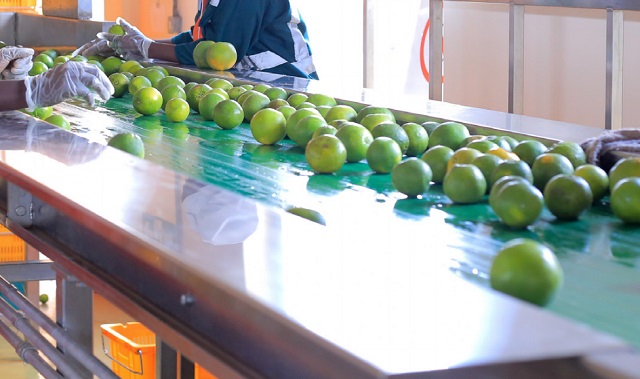
But dealers are crying for government support amidst COVID-19 crisis
Kampala, Uganda | JULIUS BUSINGE | Uganda’s fruits and vegetable exports maintained a growth trend amidst the coronavirus pandemic in 2020, but dealers insist they are loss making and need tangible support from government.
Latest data from Bank of Uganda shows that the country exported 83.5million tons of fruits and vegetables worth $45million in 2020 compared to 68.8million tons worth $36million in the previous year.
The increase in exports during the 2020 COVID-19 lockdown year is a shock to sector analysts and industry players.
“But I made losses on my side,” Juliet Nakawuuki, a farmer in Mityana district told The Independent on Feb.25.
Nakawuuki, who farms sweet potatoes, chili and hot pepper, and exports her products through Ice Mark – Africa Limited to the European market said she did not export anything out of her five acres of sweet potatoes and from her chili gardens.
She only sold small quantities from her hot pepper garden. “The whole of 2020 was so bad on my side,” she said. Nakawuuki has been in business for close to three years.
She has decided to put the business on hold because of the 2020 frustration, and plans to resume in the second season of 2021.
Apart from Covid-19 induced challenges, Nakawuuki said, she gets frustrated when buyers report to her that part of her fresh foods are rejected in the outside market because they do not meet market standards.
“They will tell you that your products are chemical sprayed even when you did not apply chemicals…I think they mix products from different farmers and that is how we end up losing,” she said.
She listed other challenges affecting her farming business as drought, price fluctuation and transport.
Part of the solutions, she said, is that the government should support organised farmers by offering them credit facilities, extension services, access to inputs and irrigation services.
Similarly, James Kanyije, the chief executive officer for KK Foods, exporters of fresh foods and vegetables said the outbreak of COVID-19 at the beginning of 2020 significantly caused a sharp drop in their exports.
He said the company exported nothing in March and April when coronavirus restrictions were put in place by government.
He said export volumes dropped from 63 tonnes prior to COVID-19 restrictions to 40 tonnes per week in May 2020 and the following months– far below the 100 tonnes capacity for the company.
Kanyije said lucrative markets of Canada and America stopped importing their products due to COVID-19 crisis.
He said those that could try to export found it difficult to make money due to the high cost of flights starting April and beyond.
Kanyije said since 2020 to date, KK Foods is only feeding some markets in the European Union and England (Britain).
The company had been cleared to export significant quantities of frozen matooke, peas, beans and eggplants to the US market but the contract has been cancelled after importers realised KK Foods and its farmers lack the financial muscle to meet monthly demands.
The situation was worsened by coronavirus which caused a dip in revenue for the company.
“We need patient capital to inject into the farmers,” he said.
KK Foods is unsure about benefiting from the Uganda Development Bank affordable credit that government promised “because we have not seen it yet.”
“We do not know what is happening,” Kanyije said.
In an interview with The Independent on Oct.29, 2020, Moses Kaggwa, the acting director for economic affairs at the Ministry of Finance Planning and Economic Development said that government had by then injected Shs455billion in Uganda Development Bank specifically to support the private sector access affordable credit in line with government’s COVID-19 recovery programme.
But private sector players said, they had not received the money.
Without UDB support, players like KK Foods would have to opt for credit from commercial banks.
But banks, according to Kanyije are offering credit expensively and with tough conditions.
For instance, he said, for one to get $1million, lenders want collateral worth $2million.
“Government should provide money in UDB and give it to those that need it without collateral because they know us; we know each other,” he said.
Meanwhile, as COVID-19 hit, Kanyije said, they retained all their workers mostly casual on condition they allowed a pay cut.
Going forward, he said, the future of horticulture in Uganda is bright for as long as there is working capital to invest in irrigation, cold chain infrastructure with government taking lead.
The market in Europe and beyond is there and growing, he said, what is necessary is for those in government to wake up and support farmers and exporters.
According to a global research firm, Allied Market Research, organic fruits and vegetables market is projected to reach $55.86bn globally by 2027 owed to consumer awareness about healthy diet, increase in purchasing power, and changes in lifestyle and food habits.
Five year exports
According to BoU data, horticulture exports (fruits and vegetables in this case) have not performed badly. In 2015, the country exported 57million tons worth $32million, in 2016, it did 82million tons worth $43million, in 2017, a total of 97million tons were exported worth $38million, in 2019, exports totalled to 95million tons worth $40million, in 2019, 69million tons were exported worth $36million and in 2020, Uganda exported 83million tons worth $45million.
****
 The Independent Uganda: You get the Truth we Pay the Price
The Independent Uganda: You get the Truth we Pay the Price



Hi, I would just like to share with you that the figures you have posted are extremely off. I visited the Bank of Uganda website and sourced the following statistics:
-Uganda exported 83,554 tonnes of fruits and vegetables in 2020 worth USD $45.23 million.
-Uganda exported 68,862 tonnes of fruits and vegetables in 2019 worth USD $36.11 million.
Be blessed.